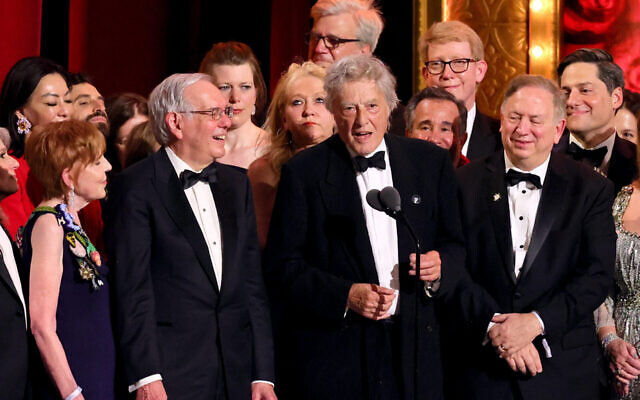Big winners at the Tony Awards
Antisemitism-themed ‘Leopoldstadt’ and ‘Parade’ are big Tony Awards winners.

(JTA) – Broadway made a statement about antisemitism Sunday evening, as two high-profile shows on the subject this season — the play Leopoldstadt and the musical revival Parade — pulled in multiple major Tony awards.
Some of the shows’ honourees, in turn, made statements of their own linking hatred of Jews with other forms of hatred, including homophobia and anti-transgender sentiment at a time when trans inclusion is under attack in many places.
Leopoldstadt, Tom Stoppard’s epic semi-autobiographical play about three generations of a Viennese Jewish family before and after the Holocaust, won four of the six Tonys for which it was nominated, including best play. (It was Stoppard’s fifth Tony, coming 55 years after his first, for Rosencrantz and Guildenstern are Dead.)
The Leopoldstadt actor Brandon Uranowitz, the only member of the play’s large cast to receive an acting nomination, won for featured actor in a play and thanked Stoppard for writing a show about antisemitism and “the false promise of assimilation.” He noted that members of his family were murdered by the Nazis in Poland.
Uranowitz, who is gay, ended with a plea to parents: “When your child tells you who they are, believe them.”
Parade, about the 1915 lynching of American Jew Leo Frank, won two prizes, including best revival of a musical. Alfred Uhry, who wrote the book to the original 1998 production of Parade, wore a Star of David lapel pin when he came up to accept the award for best revival.
Michael Arden, the show’s director, noted in his speech that Leo Frank had “a life that was cut short at the hands of the belief that one group of people is more or less valuable than another,” which he noted is “at the core of antisemitism, of white supremacy, of homophobia, of transphobia, of intolerance of any kind.”
Arden warned the crowd to learn the lessons of the show, “or else we are doomed to repeat the horrors of our history.” He concluded his speech with an expletive, bleeped out by the telecast, as he voiced his support of trans and nonbinary youth.
While Parade took the top prize, as well as best director of a musical, its Jewish stars Ben Platt and Micaela Diamond both lost out in their categories — Platt to Some Like It Hot star J. Harrison Ghee, and Diamond to Kimberly Akimbo star Victoria Clark. But Platt and Diamond did share a moment onstage, performing the Parade number ‘This Is Not Over Yet’ in character as an imprisoned Frank and his wife Lucille.
The non-Jewish actor Sean Hayes won best actor in a play for his role as Oscar Levant, the real-life Jewish concert pianist, actor and entertainer who had lifelong struggles with mental illness, in Good Night, Oscar.
“This has got to be the first time an Oscar won a Tony,” Hayes quipped, adding that Levant’s “wit and irascibility and virtuosity is not only inspirational but a true original.”
There were several other Jewish moments at the show.
Jewish Broadway legends John Kander (96 years old) and Joel Grey (91 years old) received the evening’s lifetime achievement awards, with Grey’s actress daughter Jennifer Grey presenting him with his honour.
Among the pair’s many achievements: Kander composed and Grey starred in Cabaret, a musical set in Weimar-era Germany, and Grey mounted the recent successful Yiddish-language revival of Fiddler on the Roof. Kander is also the composer behind New York, New York, a new show whose musician characters include a Jewish refugee from Nazi-occupied Poland.
Miriam Silverman won the featured actress in a play award for her role in The Sign in Sidney Brustein’s Window, a revival of a long-overlooked Lorraine Hansberry play about a Jewish bohemian couple in 1960s Greenwich Village.
Lea Michele, despite not being eligible for a Tony for taking over for Beanie Feldstein in Funny Girl, performed her signature tune from the show about the Jewish comedian Fanny Brice.
A Beautiful Noise, a biographical jukebox musical about chart-topping Jewish pop crooner Neil Diamond, also snuck in a performance of ‘Sweet Caroline’ despite not being nominated for anything. The crowd gamely sang along.
And an unexpected Jewish shoutout came near the end of the ceremony, when the cast of the musical comedy Shucked, a show about corn, performed a song instructing viewers about the many places where the vegetable can be enjoyed. Among the options: “Bring it to a bris!”

comments